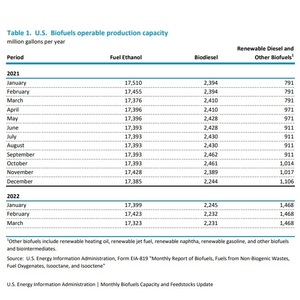EIA: US biofuels capacity down in March, feedstock use up

May 31, 2022
BY Erin Krueger
Total operable U.S. biofuels production capacity fell by approximately 101 million gallons in March, according to data released by the U.S. Energy Information Administration on May 31. Feedstock consumption, however, was up by 2.845 billion pounds.
Fuel ethanol production capacity fell to 17.323 billion gallons in March, down 100 MMgy from the 17.423 billion gallons of capacity reported for February. When compared to the 17.376 billion gallons of capacity in place in March 2021, fuel ethanol capacity for March 2022 was down 53 MMgy.
Biodiesel capacity was at 2.231 billion gallons in March, down 1 MMgy when compared to the 2.232 billion gallons of biodiesel capacity reported for February and down 179 MMgy when compared to the 2.41 billion gallons of capacity reported for March 2021.
Advertisement
Capacity for renewable diesel and other biofuels, defined to include renewable heating oil, renewable jet fuel, renewable naphtha, renewable gasoline and other biofuels and biointermediates, held steady at 1.468 billion gallons in March. When compared to 791 MMgy of capacity reported for the same month of last year, capacity for renewable diesel and associated biofuels was up 677 MMgy.
Total feedstock consumption for March reached 27.193 billion pounds, up from both 24.348 billion pounds the previous month and 25.093 billion pounds in March 2021.
U.S. biofuel producers consumed approximately 25.383 billion pounds of corn in March, up from both 22.74 billion pounds in February and 23.541 billion pounds in March of last year. Grain sorghum consumption fell to 97 million pounds, down from 133 million pounds in February. The EIA withheld the volume of grain sorghum that went to biofuels production in March 2021 to avoid disclosure of individual company data.
Biofuel producers also consumed 908 million pounds of soybean oil in March, up from 741 million pounds the previous month and 740 million pounds in March of last year. Corn oil consumption was at 212 million pounds, up from 188 million pounds in February and 195 million pounds in March 2021. The EIA withheld data on canola oil consumption for both February and March 2022 to avoid disclosure of individual company data, but reported that 123 million pounds of canola oil went to biofuels production in March 2021.
Advertisement
U.S. biofuel producers consumed 338 million pounds of yellow grease, 127 million pounds of beef tallow, 47 million pounds of white grease and 15 million pounds of poultry fat in March, compared to 306 million pounds, 130 million pounds, 38 million pounds, and 13 million pounds, respectively, in February. In March 2021, biofuel producers consumed 226 million pounds of yellow grease, 83 million pounds of beef tallow, 64 million pounds of white grease, 43 million pounds of poultry fat and 9 million pounds of feedstock classified as “other” waste oils, fats and greases.
An additional 66 million pounds of feedstock classified as “other” recycled feeds and wastes went to biofuels production in March, up from 59 million pounds the previous month and 62 million pounds in March 2021.
Additional data is available on the EIA website.
Related Stories
The U.S. Energy Information Administration maintained its forecast for 2025 and 2026 biodiesel, renewable diesel and sustainable aviation fuel (SAF) production in its latest Short-Term Energy Outlook, released July 8.
XCF Global Inc. on July 10 shared its strategic plan to invest close to $1 billion in developing a network of SAF production facilities, expanding its U.S. footprint, and advancing its international growth strategy.
U.S. fuel ethanol capacity fell slightly in April, while biodiesel and renewable diesel capacity held steady, according to data released by the U.S. EIA on June 30. Feedstock consumption was down when compared to the previous month.
XCF Global Inc. on July 8 provided a production update on its flagship New Rise Reno facility, underscoring that the plant has successfully produced SAF, renewable diesel, and renewable naphtha during its initial ramp-up.
The U.S. EPA on July 8 hosted virtual public hearing to gather input on the agency’s recently released proposed rule to set 2026 and 2027 RFS RVOs. Members of the biofuel industry were among those to offer testimony during the event.
Upcoming Events










